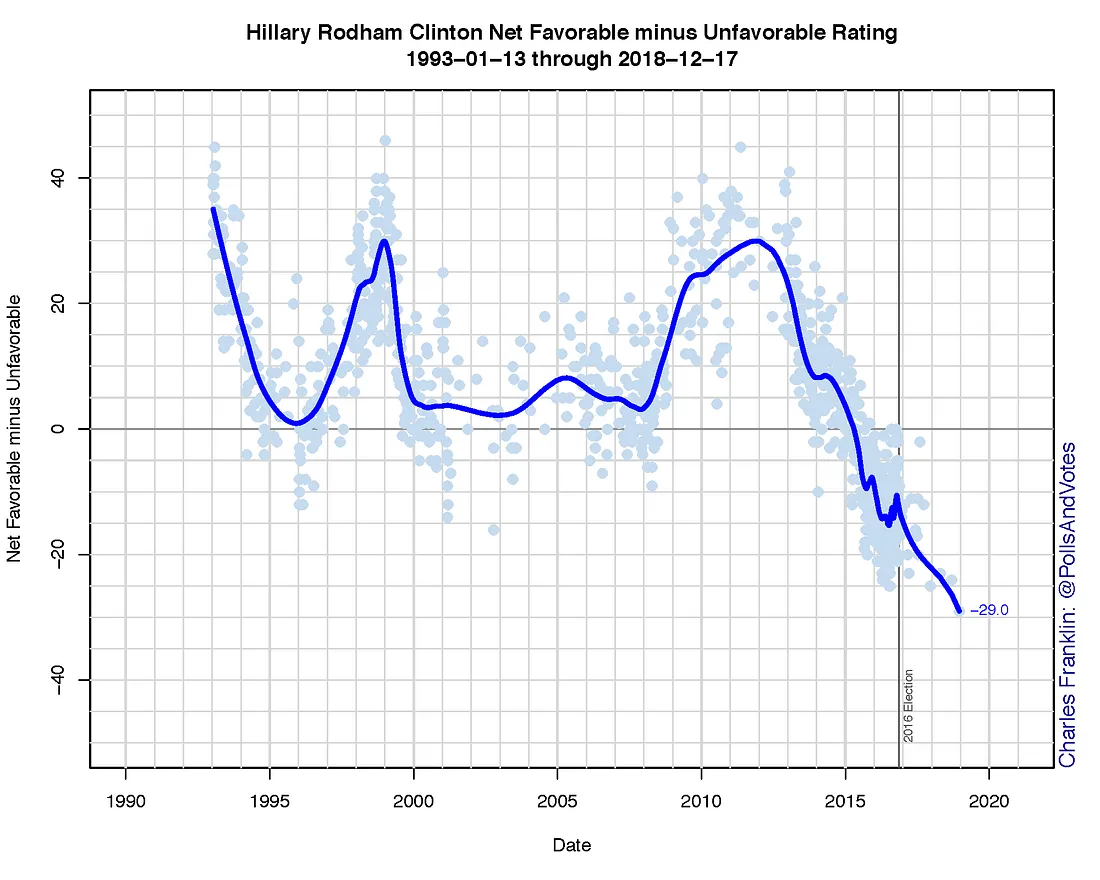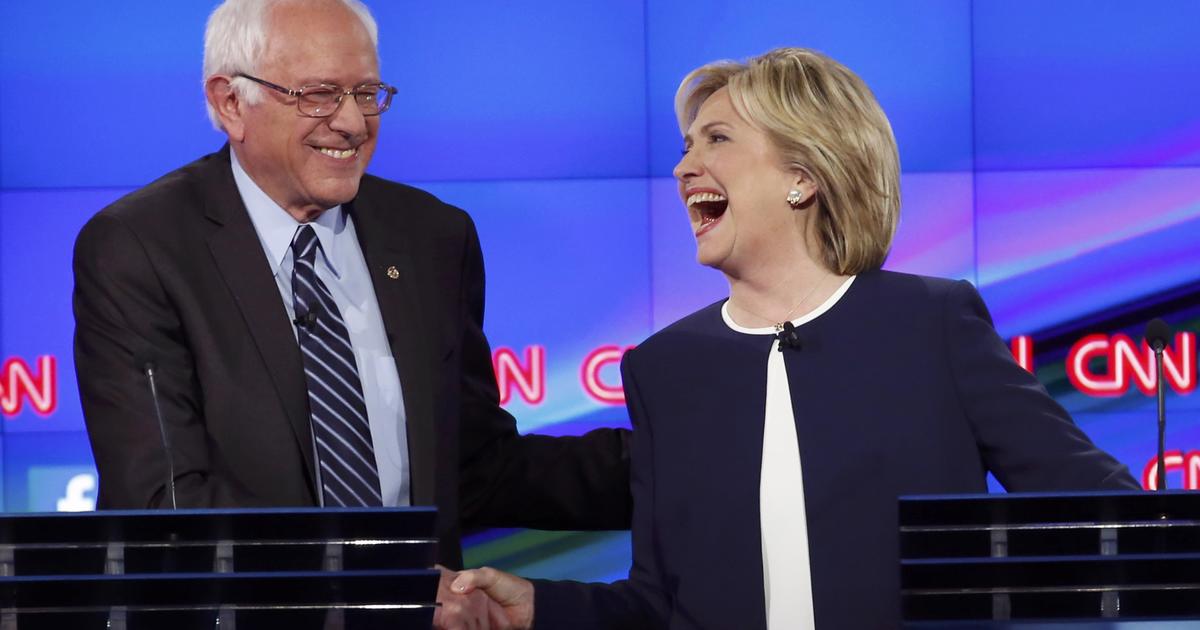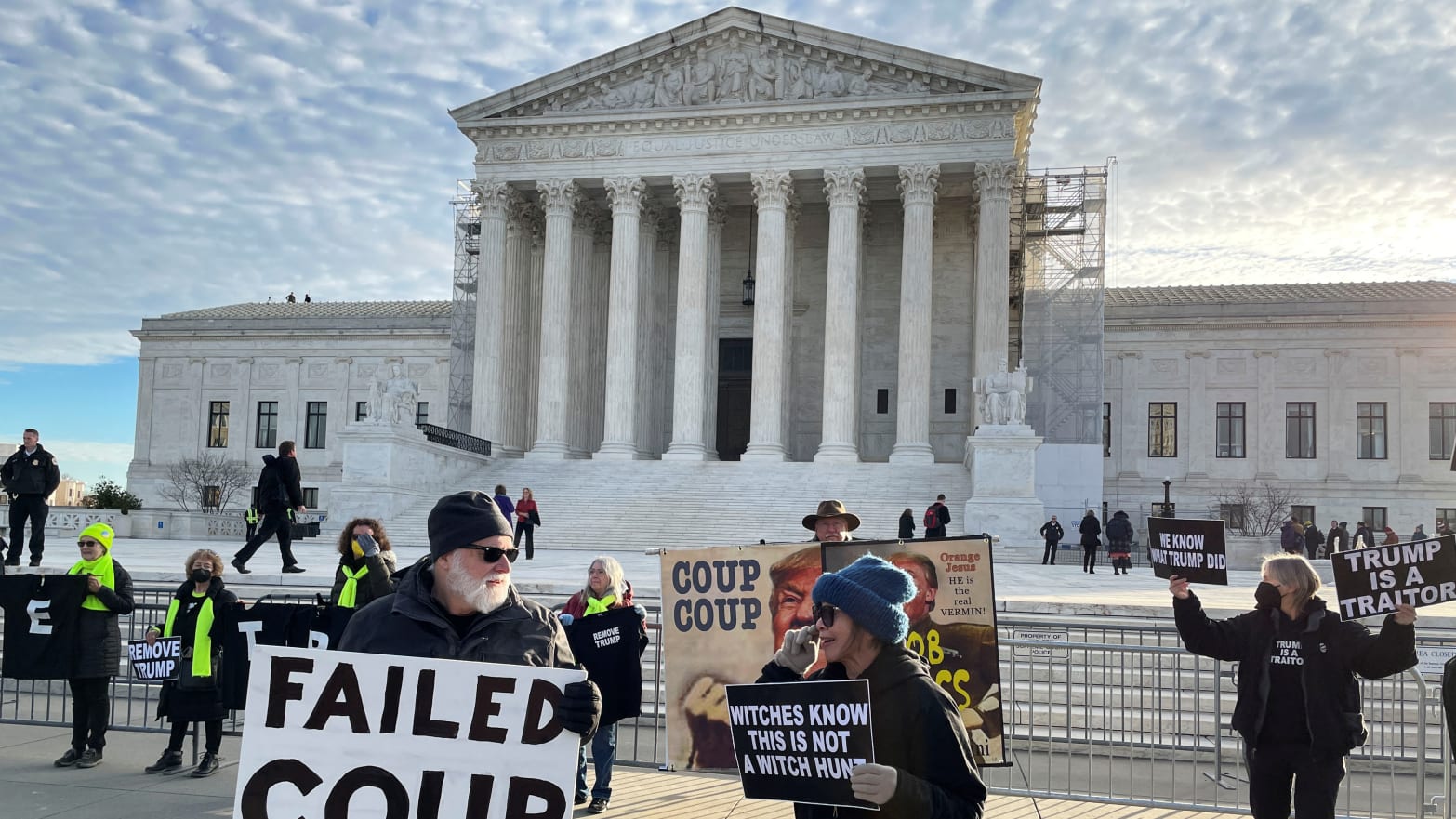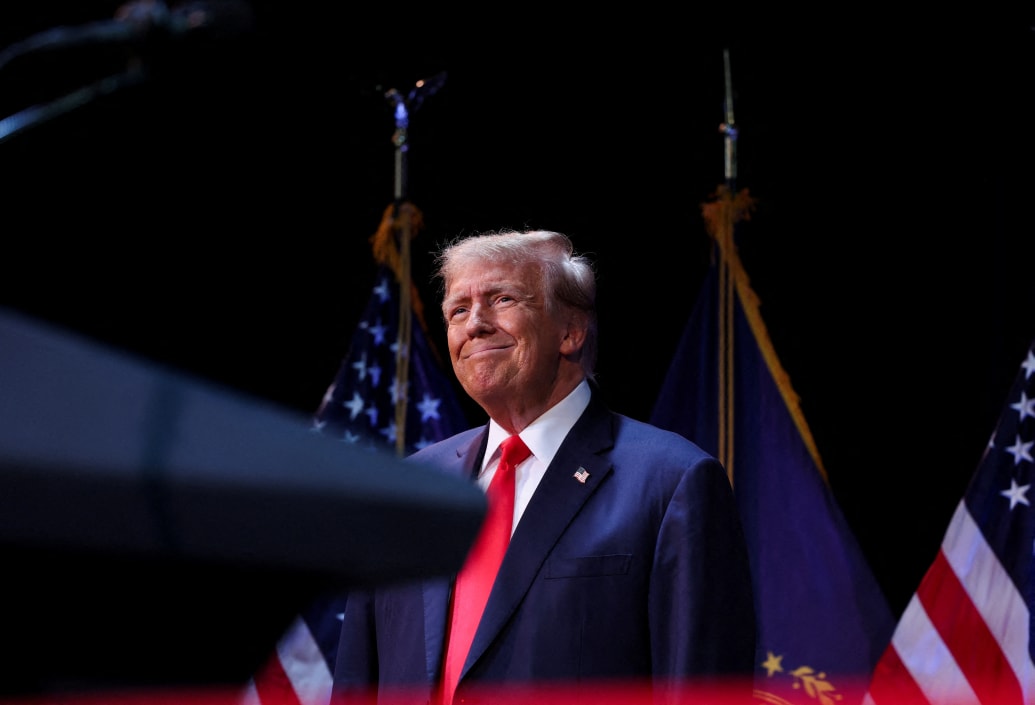Yeah that’s cool but let’s not let this make us forget about how problematic Biden and dems areTrump is saying and preparing wild shid he’ll do a year from now.
Mainstream media isn’t taking it seriously.
It is terrible
You are using an out of date browser. It may not display this or other websites correctly.
You should upgrade or use an alternative browser.
You should upgrade or use an alternative browser.
2024 U.S. Presidential Election Thread: Donald Trump wins & will return to the White House; GOP wins U.S. Senate & U.S. House
- Thread starter FAH1223
- Start date
More options
Who Replied?gonna bookmark this and post it for when any moron cosigns a politician who wants to run the country like a business.
Also, this is a chart of Hillary Clinton's net favorability. It peaked in 2012 and continued dropping consistently for the next 5 years. If Bernie was the reason she lost, then wouldn't there have been a visible drop when Bernie entered the race, or when he started attacking her? (which he never really did)

Bernie Sanders didn't say he would enter the race until April 30th, by then Clinton's net favorability was already at -10. He didn't even officially announce until May 26, and he didn't release his first campaign ad until November 1st. And he repeatedly refused to attack Clinton directly, NOTHING like how Clinton repeatedly attacked Obama in 2008.

Why Bernie Sanders won’t take the gloves off against Hillary
Hillary Clinton’s top rival for the Democratic nomination refuses to attack her directly.thehill.com

Bernie Sanders’ Refusal To Attack Hillary Clinton Isn’t Just Principled—It’s Political Genius
The democratic socialist is taking a stand by running a clean campaign, and it’s already making a big impact on the race for president.inthesetimes.com

Bernie Sanders: People are sick of hearing about Hillary Clinton's "damn emails"
The senator from Vermont wins over Clinton and the debate audience -- and possibly Donald Trump -- with his reaction to the Clinton email controversywww.cbsnews.com
Clinton lost because she was an unlikeable candidate who ran a terrible campaign and most Americans didn't support. She had every institutional advantage possible (the party, the media, the funding, and a terrible opponent), and still lost. Blaming Bernie for that is nonsense.
 We are talking about an election not a coronation. Bernie Sanders message appealed to a lot of people and that’s why he gained traction despite having virtually zero name recognition and no money.
We are talking about an election not a coronation. Bernie Sanders message appealed to a lot of people and that’s why he gained traction despite having virtually zero name recognition and no money.Hilary had been unpopular with majority of Americans since the 90s. (The hatred against were was unfair in a lot of ways). So much so, that that after the Healthcare failure of the first term, she was never given another major initiative to run.
Edit: @Professor Emeritus I meant to quote the guy you were responding to.
god damnit, joe. what happened to "im the bridge to the next generation"? just be the fukkin bridge
He's running against an elderly stiff obese drug addict who is basically a high-functioning moron, and yet just 23% of the electorate favors him when it comes to mental/physical health.
He can't even get DEMOCRATS to cosign the "mentally/physically superior" option against THIS GUY:

If he had declared he was passing the torch a year ago, this would look way different. He's gonna completely fukk the party over by trying to hang on so long.

 Another Doom & Gloom poll. This Election Cycle really going to be the nail in the coffin on Pollsters.
Another Doom & Gloom poll. This Election Cycle really going to be the nail in the coffin on Pollsters.GnauzBookOfRhymes
Superstar
Trying to get trump kicked off ballots is so fukking stupid.
Poetical Poltergeist
Precise and cold hearted
ADevilYouKhow
Rhyme Reason
Favoring Foes Over Friends, Trump Threatens to Upend International Order
Think I’ll just vote for Biden

Think I’ll just vote for Biden

Spidey Man
Superstar
I don't care if Biden is a brain dead drooling vegetable who needs Jill Biden to make all the decisions for him like Nancy Regan did for Ronald.
I'm still not voting for the orange traitor and would vote for Biden.
I'm still not voting for the orange traitor and would vote for Biden.
I don't care if Biden is a brain dead drooling vegetable who needs Jill Biden to make all the decisions for him like Nancy Regan did for Ronald.
I'm still not voting for the orange traitor and would vote for Biden.
I will vote for a vegetable too. But enough voters will be turned off from doing so that Biden needs to step aside.
Yeah the constitution shouldn't matter at allTrying to get trump kicked off ballots is so fukking stupid.
I don't care if Biden is a brain dead drooling vegetable who needs Jill Biden to make all the decisions for him like Nancy Regan did for Ronald.
I'm still not voting for the orange traitor and would vote for Biden.
people think the choice is complicated when it's really not.
Trying to get trump kicked off ballots is so fukking stupid.

Supreme Court Skeptical About Kicking Trump Off Ballot
The nation’s highest court is weighing whether Colorado and other states can pull Trump from the 2024 ballot under the 14th Amendment.www.thedailybeast.com
Trump to Supreme Court: Insurrectionists Can Be President
NOT THE PROBLEM
The nation’s highest court is weighing whether Colorado and other states can pull Trump from the 2024 ballot under the 14th Amendment.
Jose Pagliery
Political Investigations Reporter
Updated Feb. 08, 2024 11:48AM EST / Published Feb. 08, 2024 10:54AM EST

Andrew Chung/Reuters
State officials cannot prohibit Donald Trump—or anyone else—from running for the White House “even if the candidate is an admitted insurrectionist,” the former president’s lawyers told the Supreme Court on Thursday.
The nation’s highest court is now considering whether Colorado and several other states can yank Trump from the 2024 ballot, employing the 14th Amendment to deem his plot to remain in office after losing the 2020 election as an “insurrection” as defined by the Constitution.
The central issue in this historic case is that Trump has not been charged—or even convicted—of insurrection, even though several federal judges, the Justice Department, and congressional investigators have essentially deemed the Jan. 6, 2021, attack on Congress as a violent rebellion that threatened the nation’s democracy.
Trump’s lawyer, Jonathan Mitchell, warned that allowing state officials to unilaterally knock the former president from the ballot would “take away the votes of potentially tens of millions of Americans.” He argued that having states utilize the 14th Amendment as a tool this way “would be adding to and altering” the constitution’s qualifications for the presidency.
The law in question is Section 3 of the 14th Amendment, which was adopted after the Civil War as a measure that would bar from office those pro-Confederate insurrectionists who had taken an oath to support the Constitution.
The case forces the Supreme Court to closely examine that provision, which says, “No person shall be a senator or representative in Congress, or elector of president and vice president, or hold any office, civil or military, under the United States, or under any state, who, having previously taken an oath, as a member of Congress, or as an officer of the United States, or as a member of any state legislature, or as an executive or judicial officer of any state, to support the Constitution of the United States, shall have engaged in insurrection or rebellion against the same, or given aid or comfort to the enemies thereof.”
Importantly, the Constitution makes no mention of conviction. But justices know that allowing a state to take such a dramatic step could be perceived as unfair by some in the American public—even those outside Trump’s MAGA movement.
Justice Ketanji Brown Jackson explored why the provision doesn’t explicitly mention the president as being covered by this rule, noting that it starts by listing senators, congressional representatives, and electors—only to later include officers of the United States. She questioned whether it was plausible that “the framers would have smuggled it in with that catch-all phrase.”
Several other justices questioned the use of the term “officer,” showing how some of this case might hinge on whether or not a president can be deemed a federal officer, even if that would mean, paradoxically, that the Constitution keeps all insurrections out of office—except the commander in chief.
Mitchell drew from another part of the Constitution, Article II, Section 3, noting that, “The president shall commission all of the officers of the United States. The president doesn’t commission himself and he cannot commission himself.”
“If ‘officer of the United States' means appointed officials, there’s just no way he’s covered by Section 3,” he said.
The opposing lawyer, who represents the effort to keep Trump off the ballot in Colorado, dismissed this line of reasoning as too focused on language as opposed to the bigger picture.

Former U.S. President and Republican presidential candidate Donald Trump holds a campaign rally.
Reuters
“This case does not come down to mere prepositions,” said Jason Murray, who represents the Colorado woman who set this effort into motion.
Norma Anderson, a 91-year-old former Republican legislator from Colorado who has rejected MAGA politics, is the plaintiff in the case.
“States are allowed to safeguard their ballots by excluding those who are… as here, those who have engaged in insurrection against the constitution in violation of their oath,” Murray told the justices.
Justice Clarence Thomas prodded Murray to provide “contemporaneous examples” that would show that states disqualified national candidates shortly after the 14th Amendment was adopted in 1868. Murray pointed to the way Georgia’s governor disqualified a congressman that same year, but he also argued that state officials back then couldn’t yank someone from the ballot the way states want to do with Trump now because the voting system was different.
“Not surprising there are few examples, because they didn't have ballots. They were party ballots or write-in. There wouldn't be a process to determine before an election if a candidate was qualified,” Murray said.
It took nearly an hour for the court to address the heart of the matter: whether Trump’s role in whipping up the crowd of his raging supporters in Washington, D.C. three years ago counted as inciting an insurrection—or if the violent attack could be deemed as such.
“We never accepted that this was an insurrection… President Trump did not engage in any act that can be plausibly categorized in insurrection,” Mitchell told the court, claiming that the term “insurrection” is narrowly defined.
“There needs to be an organized, concerted effort to overthrow the government of the United States through violence,” he said.
“A chaotic effort to overthrow the government is not an insurrection?” Justice Ketanji Brown Jackson shot back.
That prompted Mitchell to acknowledge that “the events were shameful, criminal, violent.”
The decision is already tainted by the fact that Justice Clarence Thomas decided to remain on the panel hearing the arguments—despite the fact that his own wife played a central role in the very insurrection in question. Emails obtained by the House Jan. 6 Committee that initially investigated what led up to the violent assault on the U.S. Capitol showed that conservative activist Ginni Thomas had coordinated with John Eastman, a Trump lawyer who came up with the plan to interrupt the certification of the 2020 election. And she had even emailed Arizona state lawmakers, pushing them to engage in Trump’s plan to replace legitimate electors with MAGA loyal pawns who sought to flip the election results.
On Wednesday, a day before the Supreme Court would hear the case, Sen. dikk Durbin (D-IL) tweeted, “I’m calling for Justice Clarence Thomas to recuse himself in the 14th Amendment case determining if Donald Trump is ineligible for the 2024 ballot.”
On Thursday, the progressive group Stand Up America stressed that Thomas’ decision to remain on the panel posed a serious threat to a fair outcome.
“Justice Thomas should recuse himself from this monumental case. Ginni Thomas’ involvement in the seditious conspiracy that led to the January 6 insurrection is a bald-faced conflict of interest. If Thomas refuses, it will not only be a blatant denial of impartial review but also a rejection of Chief Justice Roberts’ recently issued Code of Conduct,” it said in a statement.
And yet Justice Thomas, who rarely speaks up, was the first to make a question, asking what role the states would play.
nah it's the smart thing to do,
GnauzBookOfRhymes
Superstar
I'm arguing the politics not the legalities.
Trump is the weakest candidate and has no message that actually appeals to enough voters to win.
I mean I can see the value if you look at it as hurting him in that it's one more thing that he has to divert time/resources
Also I get that these are generally state level efforts. I don't think it's something Biden and Co., are pushing themselves.
Trump is the weakest candidate and has no message that actually appeals to enough voters to win.
I mean I can see the value if you look at it as hurting him in that it's one more thing that he has to divert time/resources

Also I get that these are generally state level efforts. I don't think it's something Biden and Co., are pushing themselves.